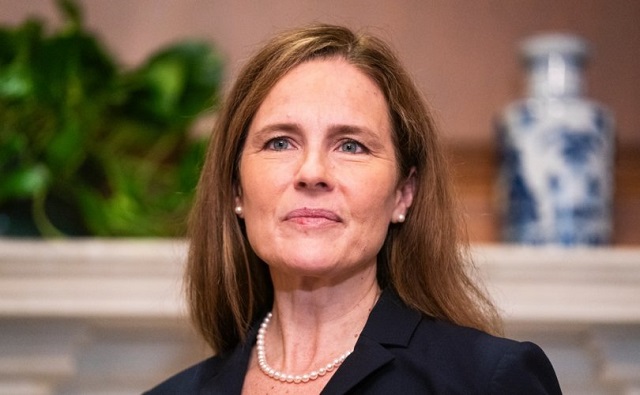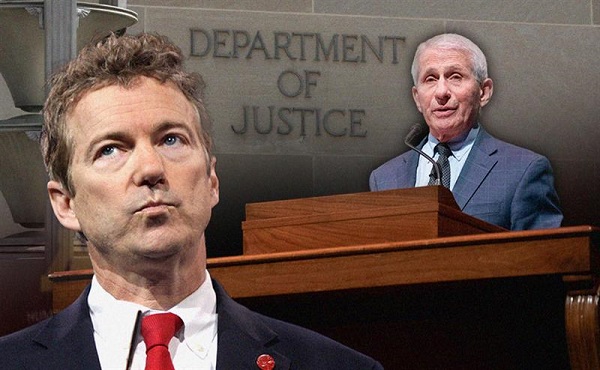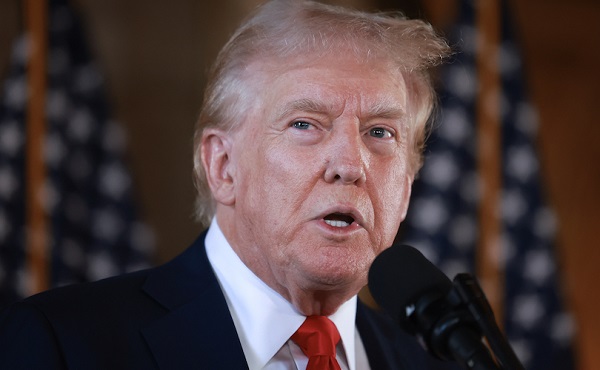International
Supreme Court unanimously rules that public officials can be sued for blocking critics on social media

From LifeSiteNews
Supreme Court Justice Amy Coney Barrett Justice noted that the personal social media accounts of public officials often present an ‘ambiguous’ status because they mix official announcements with personal content.
The United States Supreme Court ruled unanimously on Friday that government officials who post about work-related topics on their personal social media accounts can be held liable for violating the First Amendment rights of constituents by blocking their access or deleting their critical comments.
In a 15-page opinion, Justice Amy Coney Barrett noted that the personal social media accounts of public officials often present an “ambiguous” status because they mix official announcements with personal content.
The court ruled in two cases where people were blocked after leaving critical comments on social media accounts of public officials.
The first case involved two elected members of a California school board — the Poway Unified School District Board of Trustees — who blocked concerned parents from their Facebook and Twitter accounts after leaving critical comments.
The court upheld the 9th U.S. Circuit Court of Appeals ruling that said the board members had violated the parents’ free speech rights.
The second case before the court concerned James Freed, Port Huron, Michigan’s city manager who had blocked constituent Kevin Lindke from commenting on his Facebook page after deleting his remarks about the city’s COVID-19 pandemic policies.
Lindke believed that Freed had violated the First Amendment by doing so and sued Freed.
Freed maintained that he launched his Facebook page long before becoming a public official, arguing that most of the content on his account concerned family-related matters.
Justice Barrett explained:
Like millions of Americans, James Freed maintained a Facebook account on which he posted about a wide range of topics, including his family and his job. Like most of those Americans, Freed occasionally received unwelcome comments on his posts. In response, Freed took a step familiar to Facebook users: He deleted the comments and blocked those who made them.
For most people with a Facebook account, that would have been the end of it. But Kevin Lindke, one of the unwelcome commenters, sued Freed for violating his right to free speech. Because the First Amendment binds only the government, this claim is a nonstarter if Freed posted as a private citizen. Freed, however, is not only a private citizen but also the city manager of Port Huron, Michigan — and while Freed insists that his Facebook account was strictly personal, Lindke argues that Freed acted in his official capacity when he silenced Lindke’s speech.
Barrett concluded:
When a government official posts about job-related topics on social media, it can be difficult to tell whether the speech is official or private. We hold that such speech is attributable to the State only if the official (1) possessed actual authority to speak on the State’s behalf, and (2) purported to exercise that authority when he spoke on social media.
In the end, the high court sent Lindke’s case back to the Sixth Circuit Federal Appeals Court for a second look.
Perhaps reflecting continued ambiguity following the court’s ruling, both defendant Freed and plaintiff Lindke declared victory.
“I am very pleased with the outcome the justices came to,” Freed told ABC News in a statement. “The Court rejected the plaintiff’s appearance test and further refined a test for review by the Sixth Circuit. We are extremely confident we will prevail there once more.”
Lindke was more effusive and told ABC News that he was “ecstatic” with the court’s decision.
“A 9-0 decision is very decisive and is a clear indicator that public officials cannot hide behind personal social media accounts when discussing official business,” said Lindke.
Legal experts called attention to the persistence of gray area in the law regarding social media due to the narrowness of the court’s decision.
“This case doesn’t tell us much new about how to understand the liability of the 20 million people who work in local, state, administrative or federal government in the U.S. … just that the question is complicated,” Kate Klonick, an expert on online-platform regulation who teaches at St. John’s Law School, told The Washington Post.
Katie Fallow, senior counsel for the Knight First Amendment Institute at Columbia University, told the Post that the court’s ruling does not sufficiently address public officials’ widespread use of personal “shadow accounts,” which constituents often perceive as official.
Fallow said the court was “right to hold that public officials can’t immunize themselves from First Amendment liability merely by using their personal accounts to conduct official business.”
We are disappointed, though, that the Court did not adopt the more practical test used by the majority of the courts of appeals, which appropriately balanced the free speech interests of public officials with those of the people who want to speak to them on their social media accounts.
According to The Hill, the Biden administration and a bipartisan group of 17 states and National Republican Senatorial Committee sided with officials, arguing in favor of their blocks, while the ACLU backed the cons
Friday’s ruling is only the first of several this term that deal with the relationship between government and social media.
“On Feb. 26, the justices heard argument[s] in a pair of challenges to controversial laws in Florida and Texas that seek to regulate large social-media companies,” explained Amy Howe on Scotusblog.com. “And on Monday the justices will hear oral arguments in a dispute alleging that the federal government violated the First Amendment by pressuring social media companies to remove false or misleading content. Decisions in those cases are expected by summer.”
COVID-19
Sen. Rand Paul: ‘I am officially re-referring Dr. Fauci to the DOJ’

Fr0m LifeSiteNews
‘Perjury is a crime,’ Sen. Rand Paul declared on X. ‘And Fauci must be held accountable.’
Sen. Rand Paul announced Monday that he is again pressuring the U.S. Department of Justice (DOJ) to launch a criminal probe of Dr. Anthony Fauci after The New York Times revealed his 11th-hour pardon by the Biden administration is likely invalid.
“Today, I will reissue my criminal referral of Anthony Fauci to Trump DOJ!” declared Paul, later adding, “Perjury is a crime. And Fauci must be held accountable.”
By late in the afternoon on Monday, the Kentucky senator had composed a letter to Attorney General Pam Bondi citing the times he believed Fauci had lied under oath during congressional hearings and urging the DOJ to finally investigate Fauci.
“In July 2023, I referred Dr. Anthony Fauci to the Department of Justice for lying under oath to Congress. His own emails directly contradicted his sworn testimony,” Paul wrote X.
“NYT reports Fauci was quietly pardoned by an autopen, operated by Biden’s staff. If the President didn’t authorize this pardon personally, then the Department has a duty to investigate and prosecute as it would any ordinary citizen,” Paul said.
“Fauci has been sainted by the extremist Left, but it doesn’t erase his lying before Congress,” Paul said. “I am officially re-referring Dr. Fauci to the DOJ.”
In July 2023, I referred Dr. Anthony Fauci to the Department of Justice for lying under oath to Congress. His own emails directly contradicted his sworn testimony.@NYT reports Fauci was quietly pardoned by an autopen, operated by Biden’s staff. If the President didn’t authorize… pic.twitter.com/j0wrt6QdoJ
— Senator Rand Paul (@SenRandPaul) July 14, 2025
Sen. Paul concluded his letter to Bondi by explaining that his autopen pardon is now seen to be illegitimate:
On January 19, 2025, Dr. Fauci was issued a full and unconditional pardon for any offenses that he may have committed or taken part in since 2014. Dr. Fauci was included among a group of individuals granted unprecedented preemptive pardons on President Joe Biden’s final day in office. However, new information has revealed that these pardons were executed via autopen, with no documented confirmation that the President personally reviewed or approved each individual grant of clemency.
According to reports, White House staff authorized the use of the autopen to issue the clemency documents. This raises serious constitutional and legal concerns about the legitimacy of Dr. Fauci’s Pardon.
President Donald Trump told reporters on Monday that the constant reliance on the autopen by the Biden administration is “one of the biggest scandals that we’ve had in 50 to 100 years.”
“I guarantee (Biden) knew nothing about what he was signing,” Trump asserted.
“I guarantee it,” he emphasized.
Fauci’s mendacious relationship with Congress
The senator from the Bluegrass State and Dr. Fauci have long had a combative relationship.
In 2021, Sen. Paul alleged that Fauci, who then served as director of the National Institutes of Allergy and Infectious Disease (NIAID) and as medical adviser to former President Joe Biden, “lied to Congress” when he claimed that the National Institutes of Health (NIH), of which the NIAID is a part, was not funding and had never funded “gain-of-function” research in Wuhan, China.
Then in 2023, Paul again filed a criminal referral to the DOJ against the White House COVID czar for lying to Congress about his role in subsidizing controversial gain-of-function (GOF) research that was suspected of contributing to the COVID outbreak.
“We have him dead to rights, the problem is this: we have Merrick Garland who I think is a pure rank partisan,” Paul said at the time. “I don’t think he’ll ever be prosecuted. We also have a Democrat Party that is happy to have paid him more than the president, more than any president makes and he actually got a million dollars from a private foundation while he was still a public servant. Everything about this is rotten to the core and if we don’t bring him to justice we’ll never get the control we need on this type of research to try and prevent it from happening again.”
Paul has said multiple times that Dr. Fauci should “go to prison” for lying to Congress.
Education
Trump praises Supreme Court decision to allow dismantling of Department of Education

From LifeSiteNews
Monday, the Supreme Court blocked an order by a federal judge that would have forced the Department of Education to reinstate nearly 1,400 employees fired by the Trump administration.
President Trump hailed the Supreme Court’s ruling allowing the continued dismantling of the U.S. Department of Education and the return of its authority and functions to individual states, “a Major Victory to Parents and Students across the Country.”
In a decision issued on Monday, the high court blocked an order by a federal judge in Massachusetts that would require the Department of Education to reinstate nearly 1,400 employees who had been terminated by the Trump administration in March.
“The United States Supreme Court has handed a Major Victory to Parents and Students across the Country, by declaring the Trump Administration may proceed on returning the functions of the Department of Education BACK TO THE STATES,” wrote the president on Truth Social.
“Now, with this GREAT Supreme Court Decision, our Secretary of Education, Linda McMahon, may begin this very important process,” said Trump. “The Federal Government has been running our Education System into the ground, but we are going to turn it all around by giving the Power back to the PEOPLE.”
“America’s Students will be the best, brightest, and most Highly Educated anywhere in the World. Thank you to the United States Supreme Court!” added the president.
“Today, the Supreme Court again confirmed the obvious: the President of the United States, as the head of the Executive Branch, has the ultimate authority to make decisions about staffing levels, administrative organization, and day-to-day operations of federal agencies,” noted Secretary of Education, Linda McMahon. “While today’s ruling is a significant win for students and families, it is a shame that the highest court in the land had to step in to allow President Trump to advance the reforms Americans elected him to deliver using the authorities granted to him by the U.S. Constitution.”
“The U.S. Department of Education will now deliver on its mandate to restore excellence in American education,” explained McMahon. “We will carry out the reduction in force to promote efficiency and accountability and to ensure resources are directed where they matter most – to students, parents, and teachers. As we return education to the states, this Administration will continue to perform all statutory duties while empowering families and teachers by reducing education bureaucracy.”
When leftist Democratic Senator Elizabeth Warren took to X to decry the court’s decision and attempted to take the moral high ground by saying, “Every kid in America deserves access to a good public education,” Sec. McMahon used a deft bit of jujitsu to respond.
“I couldn’t agree more,” said McMahon, “and that’s why we need to return education to the states.”
Sen. Warren wasn’t the only one issuing hyperbolic prophesies of disaster following the court’s decision.
“Trump and his allies” are taking “a wrecking ball to public schools and the futures of the 50 million students in rural, suburban, and urban communities across America,” asserted Becky Pringle, president of the nation’s largest teachers’ union, the National Education Association.
In her written dissent, in which she was joined by Justices Elena Kagan and Ketanji Brown Jackson, Sonia Sotomayor predicted nothing short of disaster.
The majority’s decision “will unleash untold harm, delaying or denying educational opportunities and leaving students to suffer from discrimination, sexual assault, and other civil rights violations without the federal resources Congress intended.”
“The Supreme Court has handed Trump one victory after another in his effort to remake the federal government, after lower courts have found the administration’s actions probably violate federal law,” lamented a report by the Associated Press. “Last week, the justices cleared the way for Trump’s plan to significantly reduce the size of the federal workforce. On the education front, the high court has previously allowed cuts in teacher-training grants to go forward.”
-

 Business1 day ago
Business1 day agoCarney Liberals quietly award Pfizer, Moderna nearly $400 million for new COVID shot contracts
-

 Frontier Centre for Public Policy2 days ago
Frontier Centre for Public Policy2 days agoCanada’s New Border Bill Spies On You, Not The Bad Guys
-

 Addictions1 day ago
Addictions1 day agoWhy B.C.’s new witnessed dosing guidelines are built to fail
-

 Business1 day ago
Business1 day agoMark Carney’s Fiscal Fantasy Will Bankrupt Canada
-

 Opinion1 day ago
Opinion1 day agoCharity Campaigns vs. Charity Donations
-

 Energy2 days ago
Energy2 days agoCNN’s Shock Climate Polling Data Reinforces Trump’s Energy Agenda
-

 Red Deer1 day ago
Red Deer1 day agoWesterner Days Attraction pass and New Experiences!
-

 Opinion1 day ago
Opinion1 day agoPreston Manning: Three Wise Men from the East, Again





